
Senior physics writer Emily Conover joined Science News in 2016. She has a Ph.D. in physics from the University of Chicago, where she studied the weird ways of neutrinos, tiny elementary particles that can zip straight through the Earth. She got her first taste of science writing as a AAAS Mass Media Fellow for the Milwaukee Journal Sentinel. She has previously written for Science Magazine and the American Physical Society. She is a two-time winner of the D.C. Science Writers’ Association Newsbrief award, and a winner of the Acoustical Society of America’s Science Communication Award.

Trustworthy journalism comes at a price.
Scientists and journalists share a core belief in questioning, observing and verifying to reach the truth. Science News reports on crucial research and discovery across science disciplines. We need your financial support to make it happen – every contribution makes a difference.
All Stories by Emily Conover
-
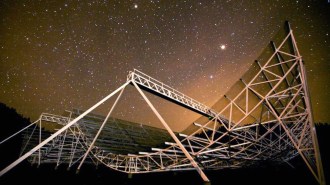 Astronomy
AstronomyA fast radio burst’s rapid, steady beat offers a clue to its cosmic origin
Amped-up neutron stars, pairs of magnetically entangled neutron stars or magnetar quakes could explain a three-second-long train of radio blips.
-
 Physics
PhysicsWiggling metal beams offer a new way to test gravity’s strength
A new experiment aims to get a better handle on “Big G,” the poorly measured gravitational constant.
-
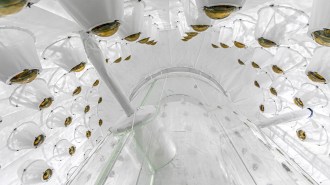 Particle Physics
Particle PhysicsA supersensitive dark matter search found no signs of the substance — yet
The LZ experiment’s first measurement raises hopes that scientists are closer than ever to finding the source of much of the universe’s mass.
-
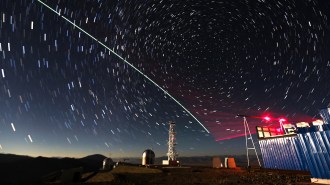 Quantum Physics
Quantum PhysicsAliens could send quantum messages to Earth, calculations suggest
Scientists are developing quantum communications networks on Earth. Aliens, if they exist, could be going further.
-
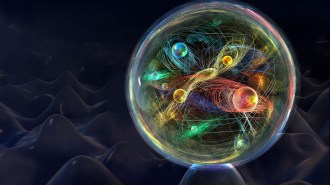 Particle Physics
Particle PhysicsHow physicists are probing the Higgs boson 10 years after its discovery
The famous particle may point to cracks in the standard model and new physics beyond.
-
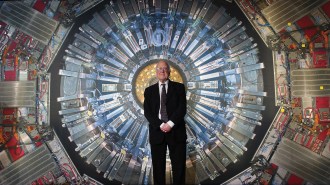
‘Elusive’ profiles the physicist who predicted the Higgs boson
Peter Higgs, as Frank Close reveals in his new book, was just one of many physicists who helped crack the mystery of mass’s origins.
-
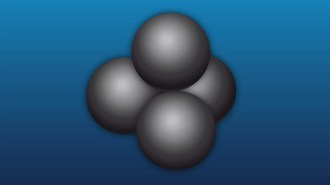 Physics
PhysicsPhysicists may have finally spotted elusive clusters of four neutrons
Long-sought clumps of four neutrons called tetraneutrons last less than a billionth of a trillionth of a second, an experiment suggests.
-
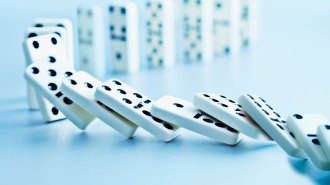 Physics
PhysicsHow fast a row of dominoes topples depends on friction
Computer simulations reveal that two types of friction are important in determining how quickly dominoes collapse.
-
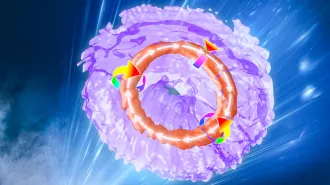 Physics
PhysicsScientists created ‘smoke rings’ of light
A swirling doughnut of light shows that vortex rings aren’t just for fluids anymore.
-
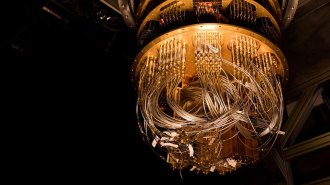 Quantum Physics
Quantum PhysicsQuantum physics exponentially improves some types of machine learning
It wasn’t entirely clear if quantum computers could improve machine learning in practice, but new experiments and theoretical proofs show that it can.
-
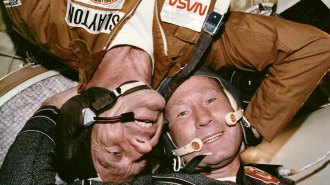 Space
Space50 years ago, the United States and Soviet Union joined forces for science
In 1972, U.S. and Soviet leaders agreed to work together on science. Now, Russia’s war in Ukraine is straining that decades-long partnership.
-
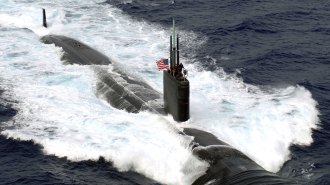 Particle Physics
Particle PhysicsHow neutrinos could ensure a submarine’s nuclear fuel isn’t weaponized
Nuclear submarines could be monitored with the help of neutrinos to ensure that the fuel isn’t diverted to nuclear weapons programs